Ever stood in front of your pantry, margarine-less, with a recipe screaming for it? We’ve all been there.
Sometimes, life doesn’t hand us margarine.
Instead, we get an opportunity to be creative. To experiment.
Have you tried rummaging through your kitchen, hunting for that perfect margarine substitute? Oh, the chaos. The suspense. We get it.
We’ve faced those butter vs. oil debates.
Grocery runs? Who’s got the time? We sure didn’t when our baking spree hit at midnight.
Here’s to those moments of culinary genius. The pivot. Our kitchen, our rules.
Finding these substitutes became our mini-victory lap around the kitchen island.
Ready to uncover the top margarine swaps?
Because, honestly, who needs margarine to whip up magic?
What is Margarine?

Margarine is a food product that, although it is not real butter, is a common substitute for butter.
To understand why margarine, you must first understand what margarine is.
Margarine is the result of hydrogenation; the process removes some of the natural oils and replaces them with a hydrogenated substance called trans fat.
Although it might not seem reasonable for you, there are many reasons why margarine is a popular substitute for butter.
The more obvious reason margarine is present more than butter is because it lasts longer than butter and can be kept at room temperature for long periods.
Because of this, it’s easier to use and spread on toast or bagels needed.
The 5 Best Substitutes for Margarine
Margarine is a popular butter substitute that is commonly used in baking, cooking, and spreading.
However, if you don’t have margarine on hand or prefer an alternative, there are several substitutes available that can provide similar characteristics and flavors.
| Substitute | Key Characteristics | Proper Ratio |
|---|---|---|
| Olive Oil | Healthy oil with a mild flavor | Use 3/4 cup of olive oil for every 1 cup of margarine in baking recipes |
| Coconut Oil | Solid at room temperature, adds a hint of coconut | Use an equal amount of coconut oil as a substitute for margarine |
| Peanut Butter | Creamy texture and nutty flavor | Use an equal amount of peanut butter as a substitute for margarine |
| Canola Oil | Neutral flavor, liquid at room temperature | Use 1 cup of canola oil for every 1 cup of margarine in baking recipes |
| Ghee or Clarified Butter | Rich, buttery flavor | Use an equal amount of ghee or clarified butter as a substitute for margarine |
Now let’s dive into each substitute in more detail:
1 – Olive Oil
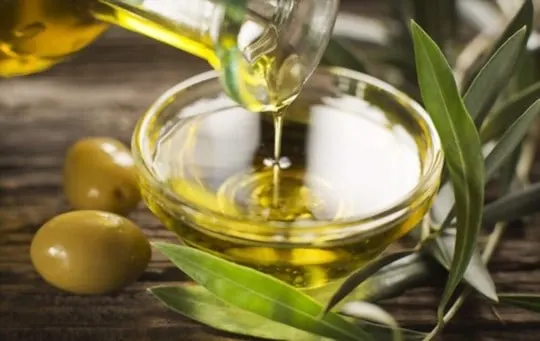
Olive oil is an excellent substitute for margarine when you are cooking.
It adds a bold flavour to all of your dishes and is also healthier, as it’s low in saturated fats.
When you cook, olive oil will give you more taste without adding more saturated fats to your diet.
The other substitute for margarine that might be available to you is olive oil.
Olive oil is also a monounsaturated fat and contains essential vitamins and minerals.
Some people recommend using olive oil instead of canola oil because it doesn’t break down when heated.
Still, both oils should have the same calories or fewer calories than the margarine they are replacing.
You’ll need to read the label on your substitute to see if it contains any trans fats, saturated fats or other ingredients you need to avoid.
- Key Characteristics: Olive oil is a healthy oil that offers a mild flavor. It can be used as a substitute for margarine in baking recipes.
- Use 3/4 cup of olive oil for every 1 cup of margarine in baking recipes. Keep in mind that olive oil may change the texture and taste slightly, so it’s best to use extra virgin olive oil for its superior flavor.
2 – Coconut Oil
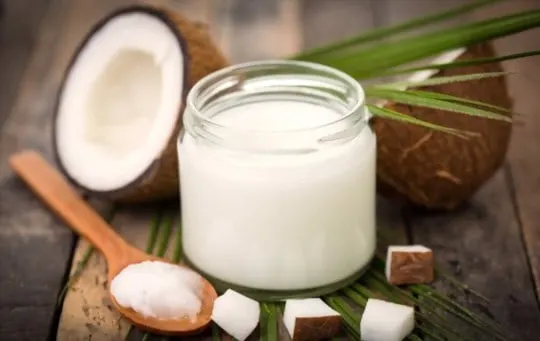
Coconut Oil is also an excellent substitute for margarine because of its flavour in dishes that you cook.
The only issue with coconut oil is that it can be hard to find at some local grocery stores, but it is worth the extra effort to find it because of how delicious it tastes and is healthy.
The exact ratio of oil to solid fat will depend on the ratio of saturated to unsaturated fats in your vegetable oil, so you’ll need to do a little math to get the right combination.
The ratio of Coconut Oil to Butter varies depending on what you are cooking, but the ratio of Coconut Oil to Butter substitutes is 2:1.
- Key Characteristics: Coconut oil is solid at room temperature and provides a hint of coconut flavor. It can be used as a direct substitute for margarine, especially in recipes where a subtle coconut taste is desired.
- Use an equal amount of coconut oil as a substitute for margarine. Ensure that the coconut oil is in solid form when measuring.
3 – Peanut Butter
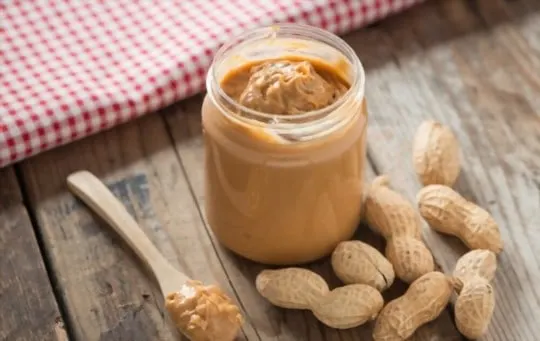
Peanut butter is a creamy and smooth alternative to margarine, used in many foods.
Some people prefer peanut butter over margarine since peanut butter can add a unique taste to any dish you make where you usually use margarine.
In addition to this, if you use peanut butter when cooking, you cut down on the amount of saturated fats in your food.
Although peanut butter doesn’t contain any cholesterol or trans fats, it does have some saturated fat — 6 grams per serving.
It also has 160 calories per serving, so keep an eye on how much you’re eating when you use peanut butter as a spread on your toast and crackers.
- Key Characteristics: Peanut butter offers a creamy texture and a nutty flavor. While it may not work as a replacement in every recipe, it can be used as a spread or in certain baked goods.
- Use an equal amount of peanut butter as a substitute for margarine. Keep in mind that peanut butter may add a slightly different taste to the final product.
4 – Canola Oil
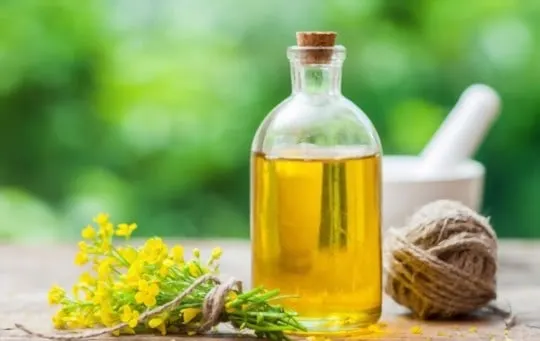
Canola oil is one of the best substitutes for margarine, as it is a monounsaturated fat like olive oil.
It contains omega-3 fatty acids, suitable for your heart, and is low in saturated fat.
Canola oil has a mild flavour that goes well with many foods.
One tablespoon of canola oil has only 46 calories, but it still gives you the flavour you crave from butter or margarine.
- Key Characteristics: Canola oil has a neutral flavor and is liquid at room temperature. It can be used as a substitute for margarine in baking recipes.
- Use 1 cup of canola oil for every 1 cup of margarine in baking recipes. Since canola oil is a liquid, it may affect the texture of the final product, so it’s best suited for recipes where a more moist result is desired.
5 – Ghee or Clarified Butter
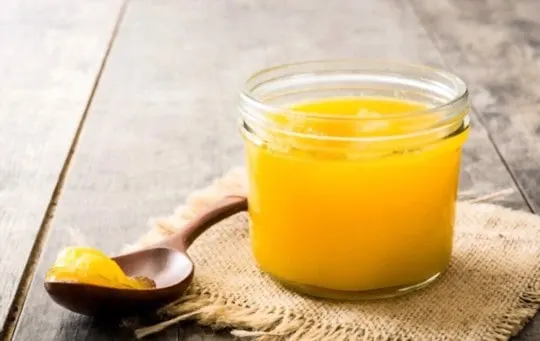
Another good alternative to margarine is ghee or clarified butter which has had all the milk solids removed, making it a pure fat that is more stable than regular butter.
Ghee is made by simmering butter until all of the water evaporates, and only the milk solids remain on top of the liquid.
Ghee has a higher smoke point than regular butter and doesn’t burn as quickly when cooking at high temperatures.
It also contains far less lactose and casein than standard dairy products.
A tablespoon of ghee has about 110 calories and no cholesterol — whereas a tablespoon of butter has about 100 calories and 7.5 grams of saturated fat).
- Key Characteristics: Ghee or clarified butter provides a rich and buttery flavor. It can be used as a substitute for margarine, especially in cooking and sautéing.
- Use an equal amount of ghee or clarified butter as a substitute for margarine. Keep in mind that ghee or clarified butter is derived from dairy, so it may not be suitable for those with lactose intolerance or dairy allergies.
Conclusion
Margarine is a butter substitute used to spread, primarily made of vegetable oils.
It has a similar taste and texture to butter but is lower in saturated fats.
Compared to butter, there are fewer calories and less cholesterol per tablespoon.
Most people will use margarine, thinking it is better for their health, but there are many health risks involved when using this substitute.
You can find substitutes that are healthier and are much easier to use.
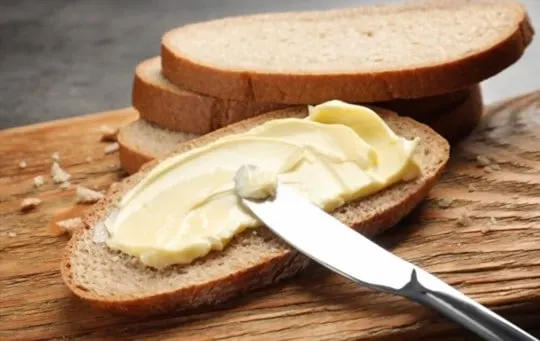
The 5 Best Substitutes for Margarine
Ingredients
- Olive Oil
- Coconut Oil
- Peanut Butter
- Canola Oil
- Ghee or Clarified Butter
Instructions
- Pick your favorite substitute from the list above.
- Follow cooking directions for your selected substitute with the proper ratio of ingredients.

Andrew Gray is a seasoned food writer and blogger with a wealth of experience in the restaurant and catering industries. With a passion for all things delicious, Andrew has honed his culinary expertise through his work as a personal chef and caterer.
His love for food led him to venture into food writing, where he has contributed to various online publications, sharing his knowledge and insights on the culinary world. As the proud owner of AmericasRestaurant.com, Andrew covers a wide range of topics, including recipes, restaurant reviews, product recommendations, and culinary tips.
Through his website, he aims to inspire and educate fellow food enthusiasts, offering a comprehensive resource for all things food-related.

Leave a comment